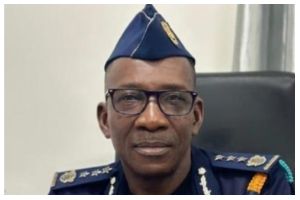Accra (Greater Accra) 28 May '99
Dr. Kwabena Adjei, Minister of Parliamentary Affairs on Thursday told the House that the only way to assert the financial independence of Parliament as granted to the Judiciary under the constitution, would be to amend the constitution.
He explained that Articles 127 (6) and 179 (3) (4) (5) and (6) of the 1992 Constitution, are specific provisions dealing with the financial independence of the Judiciary, saying the Articles do not relate to Parliament.
Dr. Adjei, who is also Majority Leader and Leader of the House, was responding to a Parliamentary question on how the Parliament of Ghana can assert its financial independence as granted the Judiciary by the Constitution.
The question, which stood in the name of Mr Kwadwo Baah-Wiredu NPP-Asante Akyem North, was asked on his behalf by Mr C.O. Nyanor, NPP-Upper Denkyira.
The Minister stressed that the provisions dealing with financial independence of the Judiciary are clear cut and said if members had any reason to believe that Parliament was not asserting itself financially, then the House could initiate moves to influence executive action on the issue.
AGC's strike action proved costly - Kan-Dapaah
Accra (Greater Accra), 29th May ?99 -
Mr Albert Kan-Dapaah, Minority Spokesman on Mines and Energy, said on Friday that the strike action of a section of
workers of the Ashanti Goldfields Company Limited (AGC), has proved costly not only to the company, but to the nation as a whole.
Quoting a catalogue of the adverse effects of the industrial action, he said the AGC lost more than 28,000 ounces of gold production while the country was poorer by more than eight million dollars of export earnings.
In addition, he said, it is estimated that even when peace is restored, the Obuasi Mine will take about one month to rebuild production to normal levels and will incur exceptional costs of more than five million dollars to repair damage and restart production.
Mr Kan-Dapaah who was making a statement in Parliament on the workers' strike at the Obuasi Gold Mine, described the action as illegal as it did not have the blessing of the Trades Union Congress (TUC) to which the local union is affiliated.
It was also illegal under the collective bargaining agreement signed with the Ghana Mine Workers' Union on May 11, 1999, he said.
Mr Kan-Dapaah said the news of the strike action travelled far and wide since the AGC's shares are quoted in both the London and New York Exchanges, adding "this must have done a terrible blow to our efforts to attract investment."
Worse still, he said, the action was embarked upon during the fifth African-African American summit and wondered what message, as a country, "we were carrying to the outside world.
Mr Kan-Dapaah, who is also MP for Afigya-Sekyere West, said much as the rights of workers have to be respected and protected at all times, "we must not allow people to take the law into their own hands".
He said neither should we allow somebody's perceived but ill-conceived rights to cause such significant damage to the national economy".
He noted that it is of considerable comfort that the Minister of Mines and Energy has denied media reports that the strikers were instigated by some politicians.
Mr Kan-Dapaah said even though the strike is over Parliament should reflect on the impasse.
"In particular, we need to probe into how an illegal strike was allowed to go on for so long such as to cause the economic damage that it did.
"We should find out why the security services allowed the illegality to go on for so long. Indeed, we should probe into why it took the Ministry of Employment and Social Welfare that much time to intervene", he said.
He said this is too important a national issue to be allowed to rest just like that.
"The private sector needs our protection and don't let it ever be said that Parliament was cowed into submission as illegality took over common sense in our society.
"Let us protect the rights of workers with the same compassion as we protect the rights and interests of investors", he added.
Endorsing the statement, Mr J.H. Mensah, Minority Leader, said it was important for Parliament to address its mind to a situation which if not properly handled, could have a long-term devastating consequences on the country's economy.
He said it is the duty of public authorities to regulate the rights of people to demonstrate, adding that over-hasty action in preventing people from exercising such right has invariably led to confrontations.
Mr Mensah described the AGC as one of Ghana's "flagship" companies, which promote the country's image abroad.
"What they say about economic conditions in the country, is what the people read".
He said the fledgling Ghana Stock Exchange overwhelmingly depends of AGC trading which has attracted a large proportion of foreign exchange for national development.
He said it was therefore unfortunate for "this national asset to be threatened in this way and for our reaction to be so slow in resolving the impasse".
Mr Mensah commended the efforts of the Ministers of Mines and Energy, and Employment and Social Welfare to get the workers and management together to resolve what, he said, is an illegal strike.
He warned that in a situation where there is no real wage policy for workers, the threat of industrial action will ever be present.
The Minority Leader suggested that the two sector ministers should be invited to the House to make a statement on the issue.
Contributing to the statement, Mr Dan Abodakpi, Deputy Minister of Trade and Tourism, said the relationship between employers and employees should not be antagonistic, especially at this time of global competition, "in order not to send the wrong signals".
He said there is the need for a new labour regime that does not hold the economy of the country to ransom.
He noted that if good sense had prevailed, the recent strike action by junior doctors, nurses and the Teachers and Educational Workers' Union (TEWU) would not have held the country to ransom.
Mr Doe Adjaho, Majority Chief Whip, described the statement as important but wondered why it had been made when the strike is over and, more so, when the Minister of Employment and Social welfare is out of the country on official duty.
He endorsed the suggestion that the Ministers of Employment and Social Welfare and Mines and Energy be summoned to brief Parliament on the strike action at the AGC.
Mr Kosi Kedem, NDC-Hohoe South, appealed to workers to exercise their right to go on strike with circumspection, saying "you must exercise that right as a last resort, considering the fragile nature of the national economy".
Mr Alex Adjei Acheampong, NPP-Bekwai, called for the enactment of a law to prevent what he described as "wildcat strikes".
He said, for instance, that workers can enter into negotiations with their management over salaries and conditions of service, but in the middle of such negotiations, any strike action should be considered illegal.
Nana Asante-Frempong, NPP-Kwabre, noted that Ghana can ill-afford to toy with the fortunes of the mining companies, especially the AGC, saying they are the major foreign exchange earners for the country.
General News of Friday, 28 May 1999
Source: --
Financial independence requires constitutional amendment - Minister
Entertainment











